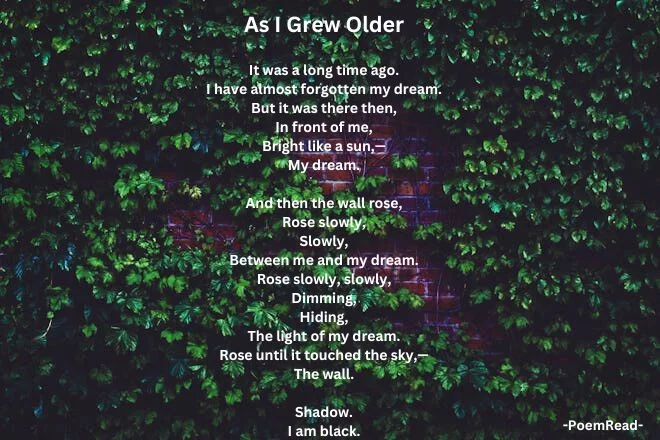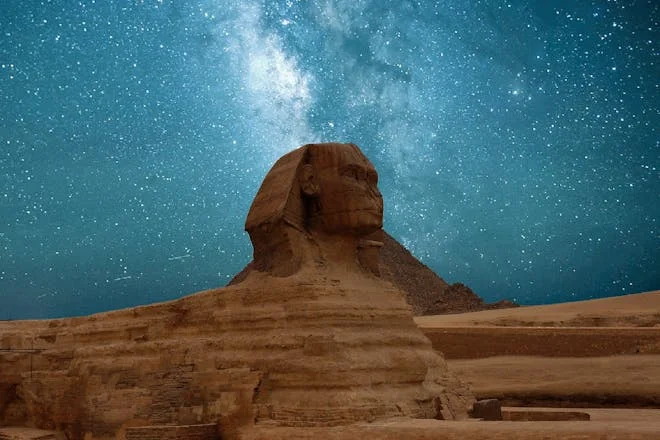“As I Grew Older” by Langston Hughes: An Analysis
April 5, 2024 | by poemread.com

In “As I Grew Older,” Langston Hughes paints a picture of dreams overshadowed by barriers. The poem reflects on a time when dreams were bright but are now dimmed by a figurative wall. This wall symbolizes obstacles, like racism, that stand in the way of achieving aspirations. Through thought-provoking language, Hughes urges us to consider how we can break through these barriers to reclaim our dreams and pursue a brighter future. Let’s unravel the beauty and strength found within the lines of this moving piece.
As I Grew Older
Langston Hughes
It was a long time ago.
I have almost forgotten my dream.
But it was there then,
In front of me,
Bright like a sun,—
My dream.
And then the wall rose,
Rose slowly,
Slowly,
Between me and my dream.
Rose slowly, slowly,
Dimming,
Hiding,
The light of my dream.
Rose until it touched the sky,—
The wall.
Shadow.
I am black.
I lie down in the shadow.
No longer the light of my dream before me,
Above me.
Only the thick wall.
Only the shadow.
My hands!
My dark hands!
Break through the wall!
Find my dream!
Help me to shatter this darkness,
To smash this night,
To break this shadow
Into a thousand lights of sun,
Into a thousand whirling dreams
Of sun!
Content
- About the Author: Langston Hughes
- Subject of "As I Grew Older"
- Context of "As I Grew Older"
- Themes and Tone in “As I Grew Older”
- Form and Structure of “As I Grew Older”
- Line-by-Line Analysis of "As I Grew Older"
- Literary and Poetic Devices in “As I Grew Older”
- Implications and Meanings of "As I Grew Older"
- Interactive Summary of "As I Grew Older"
About the Author: Langston Hughes
Langston Hughes, born in 1902, was an American poet, social activist, novelist, playwright, and columnist. He is widely regarded as a leader of the Harlem Renaissance, a cultural movement that took place in the 1920s and 1930s in Harlem, New York City. Hughes was known for his insightful and powerful portrayals of African American life and the struggles faced by the black community. His works often explored themes of identity, racism, and the pursuit of the American Dream.
Subject of “As I Grew Older”
Langston Hughes’ poem “As I Grew Older” explores the African American dream and the obstacles created by racism that hinder its realization. The speaker represents the collective black voice and contemplates a once-promising dream, symbolizing hope and potential. The systemic societal barriers resulting from racism, however, are now casting a shadow over this dream.
Racism’s shadow dims the light of progress, thwarting not just a personal dream but a communal aspiration for equality and opportunity. Despite initially feeling overwhelmed, the poem shifts towards a call for action eventually. The speaker’s “dark hands” breaking through the wall serve as a representation of this. This symbolizes an ongoing struggle against oppression and the reclaiming of dreams.
The poem’s theme extends beyond race, resonating universally with anyone facing obstacles to their aspirations. The “wall” metaphor encompasses all forms of discrimination and hardships. “As I Grew Older” becomes a narrative of resilience and empowerment. It emphasizes the internal strength needed to surmount barriers and pursue brighter futures. Furthermore, this poem underscores the enduring spirit of hope and determination amidst adversity. It urges individuals to harness their inner strength and take proactive steps toward realizing their dreams.
Context of “As I Grew Older”
Building on the subject of Langston Hughes’ “As I Grew Older,” the context in which this poem was written adds a layer of understanding to its message. The poem emerged during the Harlem Renaissance, a pivotal moment in American history. This was a time when African American culture experienced a renaissance in art, music, and literature.
The Harlem Renaissance
The Harlem Renaissance, spanning the 1920s and 1930s, was a beacon of African American intellectualism and artistic expression. It was a period where black writers, artists, and musicians sought to redefine the narrative around African American identity and experience. Langston Hughes was at the forefront of this movement. He used his poetry as a medium to express the hopes, dreams, and struggles of his people.
Racial Barriers of the Time
“As I Grew Older” was published in Hughes’ first collection, “The Weary Blues,” in 1926. During this time period, significant racial segregation and discrimination were prevalent. Jim Crow laws enforced a system of white supremacy and second-class citizenship for African Americans. The “wall” in Hughes’ poem is a symbolic representation of these societal barriers that prevented Black Americans from achieving their full potential.
A Personal and Collective Struggle
The context of the poem is not just historical but deeply personal. Hughes, through the speaker, portrays the internal and external conflicts experienced by black individuals in a society that systematically denied them equality. The poem’s setting in a time of notable racial tension underscores the courage required. It also highlights the resilience needed to dream of a better future.
The context of “As I Grew Older” is essential to grasping the full impact of its words. It was a call to action during the Harlem Renaissance, reminding us of the obstacles faced by the African American community. It was also a declaration of the undying hope that those barriers could and would be overcome. As we move forward to analyze the poem’s themes and tone, we carry with us an understanding of the historical backdrop that shaped Hughes’ work.
Themes and Tone in “As I Grew Older”
Themes: Dreams and Racism
The poem “As I Grew Older” by Langston Hughes is a powerful exploration of two interwoven themes. It explores the resilience of dreams and also exposes the insidious nature of racism. The speaker’s dream represents his or her aspirations and hopes for a world free of racial prejudice. It’s a beacon of light, symbolizing the potential and happiness that every human being aspires to. However, the “wall” of racism obscures this light. This barrier not only dims the dream but also threatens to erase it from memory.
Racism, the second theme, is depicted as a physical and psychological barrier that impedes the speaker’s progress. The slowly rising wall represents the systemic and pervasive nature of racial prejudice that African Americans have historically experienced. This wall is not just a hindrance; it’s a force actively working to hide the light of the speaker’s dream. It symbolizes the oppressive mechanisms that suppress the aspirations of an entire community.
Tone: From Optimism to Resignation and Determination
The tone of the poem shifts as it progresses, mirroring the speaker’s emotional journey. Initially, there’s a tone of optimism and innocence, as the speaker recalls the dream with clarity and brightness. But as the wall of racism rises, the tone becomes somber and reflective, tinged with a sense of loss and frustration. The speaker’s voice then shifts to one of determination and defiance. He calls upon his “dark hands” to break through the wall and reclaim the dream. This shift in tone from resignation to a call to action underscores the poem’s message of hope and empowerment.
The interplay of themes and tone in “As I Grew Older” creates a narrative that resonates with readers. It reflects not only the historical struggles of African Americans but also the universal human experience of striving against adversity to achieve one’s dreams. Hughes masterfully uses these literary elements to craft a poem that is both a personal testament and a universal call to break through the walls that divide us.
Form and Structure of “As I Grew Older”
Langston Hughes’ “As I Grew Older” is a testament to the poet’s skillful use of form and structure to enhance the thematic depth of his work. The poem is composed in free verse, which allows Hughes to break free from traditional poetic constraints. This style mirrors the emotional rhythm of the speaker’s journey.
Free Verse and Uneven Stanzas
The poem unfolds over five stanzas of uneven length, reflecting the unpredictable nature of the speaker’s struggle against racial barriers. The first stanza has six lines, the second ten, the third two, the fourth five, and the fifth ten. This irregular structure emphasizes the poem’s central message: the path to realizing one’s dreams is rarely straightforward or uniform.
The lines vary in length, mirroring the ebb and flow of hope and despair. The use of exclamation points in the final stanza signals a shift from resignation to a determined call to action.
The Use of Pauses and Line Breaks
Hughes employs strategic pauses and line breaks to signify the speaker’s contemplation and the weight of the “wall” of racism. The repetition of the word “slowly” and the line breaks that follow create a rhythm that mimics the gradual, oppressive rise of the wall. This allows readers to feel the speaker’s growing despair.
Punctuation and Its Significance
The poem’s minimal punctuation blurs the lines between thoughts and emotions, much like the dream that blurs into the shadow of the wall. Additionally, the lack of punctuation also contributes to a sense of continuity. This suggests that the struggle against racism is ongoing and that the fight for equality must persist.
Rhyme Scheme
While “As I Grew Older” does not adhere to a consistent rhyme scheme, the occasional internal rhymes and the rhythmic repetition of certain phrases lend a musical quality to the poem. This musicality underscores the poem’s roots in the Harlem Renaissance, a movement deeply intertwined with jazz and the oral tradition.
An example of internal rhyme within Langston Hughes’ poem “As I Grew Older” can be found in the lines: Help me to shatter this darkness, To smash this night, To break this shadow. Here, the words “shatter,” “smash,” and “break” create a rhythmic repetition that emphasizes the action of overcoming barriers.
The internal rhyme occurs with the words “night” and “light” (from earlier in the poem), which, although not in consecutive lines, resonate with each other and contribute to the musical quality of the poem. This use of internal rhyme, along with the repetition of certain phrases, helps to reinforce the poem’s themes and emotional impact.
Line-by-Line Analysis of “As I Grew Older”

Stanza 1: The Dream Once Visible
It was a long time ago.
I have almost forgotten my dream.
But it was there then,
In front of me,
Bright like a sun—
My dream.
In the opening stanza of “As I Grew Older,” Langston Hughes introduces us to the speaker’s dream, which was once a vivid and tangible presence in their life. The dream is described as being “Bright like a sun,” a powerful image that evokes feelings of warmth, hope, and potential. This brightness is not just a visual element; it represents the clarity and closeness of the dream.
However, the speaker’s admission of almost forgetting the dream introduces a tone of melancholy. It suggests that the dream has been neglected or obscured by the passage of time, or perhaps by the challenges and disappointments that life often presents. The speaker’s use of past tense, “It was a long time ago,” and “I have almost forgotten my dream,” suggests a sense of loss and distance from this once luminous aspiration.
Additionally, the repetition of “my dream” at the beginning and end of the stanza frames the passage, highlighting the personal significance of this dream to the speaker. It’s a touching reminder of how dreams can inspire and shape our lives. Yet, they can also be fragile and easily lost amidst life’s complexities.
In essence, the dream that was so clear and promising has faded, almost to the point of being forgotten. This indicates that significant time has passed, and circumstances have changed.
Stanza 2: The Emergence of the Wall
And then the wall rose,
Rose slowly,
Slowly,
Between me and my dream.
Rose slowly, slowly,
Dimming,
Hiding,
The light of my dream.
Rose until it touched the sky,—
The wall.
The second stanza shifts the focus from the dream itself to the barrier that obstructs it. The “wall” that Hughes speaks of is a metaphor for the societal and racial obstacles that African Americans have historically faced. The repeated phrase “Rose slowly, Slowly,” highlights how these barriers develop gradually and become very challenging to overcome over time. The wall rising “until it touched the sky” suggests an overwhelming and oppressive force, casting a shadow over the speaker’s life and aspirations.
The dream is not just blocked; it is dimmed and hidden. The verbs “Dimming” and “Hiding” personify the wall, attributing to it the active role of obscuring the “light of my dream.” This personification deepens the sense of loss and frustration, as the dream is not just blocked but actively concealed from the speaker’s view. This indicates that the barriers have not only prevented its realization but have also obscured its very existence.
Furthermore, the wall’s ascent “until it touched the sky” is a hyperbolic expression that conveys the overwhelming and oppressive nature of the barriers faced. It’s as if the wall has grown so vast that it blots out the horizon, leaving the speaker in a shadow of despair.
The final line, “The wall,” is a strong and definitive conclusion to the stanza. It emphasizes the wall’s dominance and the significant challenge it poses. The structure of the stanza, with its increasing repetition and final declaration, mirrors the growing sense of being trapped and the diminishing hope of achieving the dream.
Stanza 3: The Shadow of Oppression
Shadow.
I am black.
In this brief stanza, Hughes uses the word “shadow” to show the effects of the wall. The speaker’s statement, “I am black,” directly acknowledges their racial identity and the source of the oppression they face. This is both a source of pride and a cause of unjust treatment in the context of the poem.
The brevity of these lines is impactful, emphasizing the weight of the speaker’s reality. The shadow is not just a literal darkness but also a symbol of the societal barriers that the speaker, and by extension, African Americans, face. This acknowledgment of identity and its associated struggles is a powerful statement within the poem. It captures the experience of being marginalized and expresses the desire to emerge from the shadow of racism.
Stanza 4: A Turn to Defiance
I lie down in the shadow.
No longer the light of my dream before me,
Above me.
Only the thick wall.
Only the shadow.
In these lines, Langston Hughes vividly captures the speaker’s sense of defeat and entrapment. The act of lying down in the shadow signifies a moment of surrender. In this moment, the speaker is overwhelmed by the barriers symbolized by the “thick wall.” The repetition of “Only” emphasizes the totality of the speaker’s environment, which is now defined by the absence of light and the presence of the wall’s shadow.
This imagery conveys a powerful sense of isolation and confinement. It shows how the oppressive wall of racism has completely blocked the dream that once shone brightly like the sun. The dream is no longer a guiding force “before me, Above me,” but racial discrimination has replaced it with the stark reality of the wall’s shadow. This serves as a metaphor for the pervasive and limiting effects of racial discrimination.
Stanza 5: The Shattering of Barriers
My hands!
My dark hands!
Break through the wall!
Find my dream!
Help me to shatter this darkness,
To smash this night,
To break this shadow
Into a thousand lights of sun,
Into a thousand whirling dreams
Of sun!
The last stanza marks a turning point in the poem, as the speaker transitions from a state of resignation to one of defiance. The speaker’s exclamation “My hands! My dark hands!” is a call to action. It signifies the speaker’s determination to use their own physical ability to break through the wall. The hands are not just tools but symbols of strength and determination.
The use of exclamation points throughout this stanza conveys a sense of urgency and intensity. The speaker is no longer passive but is actively striving to reclaim the dream that has been hidden by the metaphorical wall of racism.
The imperative “Break through the wall! Find my dream!” serves as a powerful command to shatter the barriers that stand between the speaker and their aspirations. This stanza is a rallying cry for empowerment and an assertion of the speaker’s resolve to reclaim their obscured dream.
Furthermore, the final stanza of the poem is a beacon of hope and determination. The speaker’s plea to “Help me to shatter this darkness, To smash this night, To break this shadow” is a metaphorical battle cry against the forces of oppression.
The transformation of the “shadow” into “a thousand lights of sun” and “a thousand whirling dreams of sun” uses hyperbole to illustrate the abundance of dreams and opportunities that lie beyond the wall. This image vividly depicts liberation and the potential for a future brimming with hope and freedom. The inclusion of “sun” and “lights” serves to contrast with the earlier darkness, symbolizing a triumphant emergence from racism’s shadow into a hopeful and liberated future.
Literary and Poetic Devices in “As I Grew Older”
Langston Hughes’ poem “As I Grew Older” is rich with literary and poetic devices that enhance its themes and emotional impact. Here’s an exploration of some key devices used in the poem:
Metaphor
The “wall” is the central metaphor of the poem, representing the societal barriers of racism that prevent the speaker from achieving their dreams. It’s a powerful image that conveys the oppressive nature of these obstacles.
Simile
Hughes uses a simile when comparing the dream to the brightness of the sun, “Bright like a sun,” which emphasizes the dream’s purity, hope, and the stark contrast to the darkness that follows.
Repetition
The word “slowly” is repeated to emphasize the gradual and relentless rise of the wall of racism. This repetition also mirrors the slow, often unnoticed encroachment of systemic discrimination in society.
Personification
The wall is personified as an almost sentient barrier that actively dims and hides the light of the speaker’s dream. This personification makes the wall seem more daunting and formidable.
Apostrophe
The speaker addresses their hands directly, “My hands! My dark hands!” This apostrophe highlights the hands as agents of change and underscores the physical effort required to overcome the barriers.
Alliteration
The use of alliteration can be seen in phrases like “rose slowly” and “me and my,” which create a musical rhythm and draw attention to the significant moments in the poem.
Symbolism
The “shadow” symbolizes the darkness of racism, while the “thousand lights of sun” at the poem’s end symbolize the multitude of dreams and opportunities that lie beyond the wall.
Imagery
Vivid imagery is used throughout the poem, particularly in the contrast between light and dark, to evoke the emotional landscape of the speaker’s journey from oppression to hope.
End-Stopped Lines
Many lines in the poem are end-stopped, which creates a pause that allows the reader to reflect on the weight of each statement, such as “The wall.”
Extended Metaphor
The wall serves as an extended metaphor throughout the poem, with its characteristics and effects explored in detail, symbolizing the pervasive and enduring nature of racial discrimination.
Consonance and Assonance
The poem employs consonance and assonance in phrases like “I lie down in the shadow,” where the repetition of similar consonant and vowel sounds adds to the poem’s musical quality.
Enjambment
Hughes uses enjambment to carry the movement from one line to the next without a terminating punctuation mark, reflecting the flow of thoughts and emotions.
These devices work together to create a poem that is both a personal reflection on the African American experience and a universal message about the struggle for freedom and equality. Hughes’ skillful use of these devices ensures that the poem’s themes are conveyed with emotional depth and resonance.
Implications and Meanings of “As I Grew Older”

“As I Grew Older” explores themes of racial inequality, the struggle for self-actualization, and the resilience of the human spirit. The poem highlights the barriers faced by marginalized individuals in society and the determination required to overcome them.
It speaks to the universal human desire to pursue dreams and the obstacles that can hinder their realization. The poem serves as a call to action, urging readers to break free from the shadows and pursue their aspirations with unwavering determination.
Interactive Summary of “As I Grew Older”
“As I Grew Older” by Langston Hughes is a powerful and impactful poem that explores the theme of dreams and the barriers that can hinder their realization. Written during the Harlem Renaissance, the poem reflects the experiences and aspirations of African Americans during a time of racial inequality.
The poem begins with the speaker reminiscing about a dream that was once vivid and promising, symbolizing hope and potential. The passage of time and the emergence of oppressive barriers, however, have obscured this dream.
A metaphorical wall represents the societal and racial obstacles that African Americans have historically faced. The wall’s slow and relentless rise illustrates the insidious nature of systemic discrimination.
The speaker acknowledges their race and the shadow it casts on their lives. The shadow represents the darkness of racism, which has dimmed the light of the speaker’s dream, leading to a sense of resignation.
A pivotal moment occurs when the speaker calls upon their hands to break through the wall. This marks a shift from passivity to action, signaling a determination to reclaim the obscured dream.
The poem concludes with a powerful call to dismantle the darkness of racism, transforming it into a multitude of dreams bathed in sunlight, representing freedom and equality.
As a reader, you’re invited to reflect on the poem’s themes and consider the walls in your own life. What dreams have you pursued, and what barriers have you faced? How can Hughes’ message of resilience and hope inspire you to break through your own walls?
If you found Langston Hughes’ “As I Grew Older” intriguing, you’ll certainly appreciate our analysis of “Still Here,” as we explore themes of perseverance and overcoming challenges in this masterpiece.
RELATED POSTS
View all



